Design sprint MFA
Design sprint MFA
Design sprint MFA
Overview
This case study provides an in-depth overview of the design process and key considerations behind the development of a multi-factor authentication (MFA) process, aiming to enhance security while delivering a seamless and user experience for customers.
TL;DR: the impact
I pushed forward with a human centred plan to deliver a world class experience. The project had been running for 378 days with no decisions before I joined the project. Which equates to 102 meetings meaning 102 hours were spent talking without action.
How the sprint helped 👇
• Customer expectations and usability evaluated
• 5 business functions aligned on the plan
• Time to decision = 4 days
• Time to market = 6 sprints
My contribution
Product Design
Facilitation
Expert Interviews
The team
1 × Product Manager
1 × Product Designer
6 x Business stakeholders
Year
2023
Overview
This case study provides an in-depth overview of the design process and key considerations behind the development of a multi-factor authentication (MFA) process, aiming to enhance security while delivering a seamless and user experience for customers.
TL;DR: the impact
I pushed forward with a human centred plan to deliver a world class experience. The project had been running for 378 days with no decisions before I joined the project. Which equates to 102 meetings meaning 102 hours were spent talking without action.
How the sprint helped 👇
• Customer expectations and usability evaluated
• 5 business functions aligned on the plan
• Time to decision = 4 days
• Time to market = 6 sprints
My contribution
Product Design
Facilitation
Expert Interviews
The team
1 × Product Manager
1 × Product Designer
6 x Business stakeholders
Year
2023
Overview
This case study provides an in-depth overview of the design process and key considerations behind the development of a multi-factor authentication (MFA) process, aiming to enhance security while delivering a seamless and user experience for customers.
TL;DR: the impact
I pushed forward with a human centred plan to deliver a world class experience. The project had been running for 378 days with no decisions before I joined the project. Which equates to 102 meetings meaning 102 hours were spent talking without action.
How the sprint helped 👇
• Customer expectations and usability evaluated
• 5 business functions aligned on the plan
• Time to decision = 4 days
• Time to market = 6 sprints
My contribution
Product Design
Facilitation
Expert Interviews
The team
1 × Product Manager
1 × Product Designer
6 x Business stakeholders
Year
2023
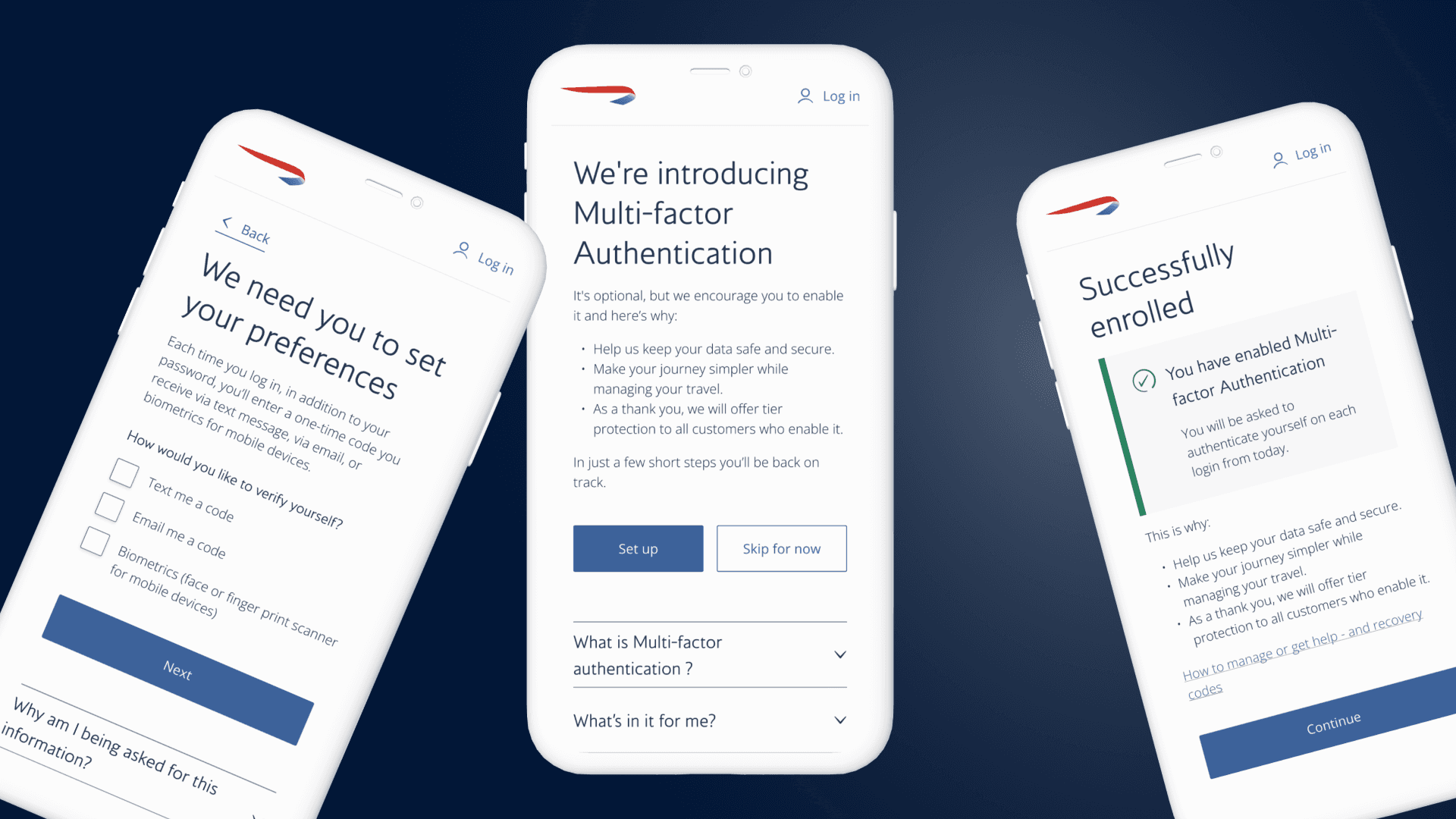


Process
Breaking down the project
After a year of project stagnation, which was due to a lack of consensus among business stakeholders, the cyber security team, and the tech team regarding the best course of action.
I was called upon to facilitate a collaborative approach that took into account everyone's perspectives and ultimately prioritised customer-centric decisions.
The sprint
The sprint consisted of 2 days of pre-planning and 4 days in sprint. During planning, I conducted expert interviews to help shape the workshops to be held during the sprint. The first 3 days of the sprint are broken up by 3 different workshops. These workshops are based on alignment, solution and decision. The 4th day is kept for prototyping and testing.
Research outcome
All participants completed the task. But the real detail came from the qualitative insights; customers expect their data to be protected, all participants spoke enthusiastically about MFA and gave examples. They were excited by the idea finally coming to British Airways. Although nominees were part of the flow, all participants found the explanation difficult, meaning they opted out.
Process
Breaking down the project
After a year of project stagnation, which was due to a lack of consensus among business stakeholders, the cyber security team, and the tech team regarding the best course of action.
I was called upon to facilitate a collaborative approach that took into account everyone's perspectives and ultimately prioritised customer-centric decisions.
The sprint
The sprint consisted of 2 days of pre-planning and 4 days in sprint. During planning, I conducted expert interviews to help shape the workshops to be held during the sprint. The first 3 days of the sprint are broken up by 3 different workshops. These workshops are based on alignment, solution and decision. The 4th day is kept for prototyping and testing.
Research outcome
All participants completed the task. But the real detail came from the qualitative insights; customers expect their data to be protected, all participants spoke enthusiastically about MFA and gave examples. They were excited by the idea finally coming to British Airways. Although nominees were part of the flow, all participants found the explanation difficult, meaning they opted out.
Process
Breaking down the project
After a year of project stagnation, which was due to a lack of consensus among business stakeholders, the cyber security team, and the tech team regarding the best course of action.
I was called upon to facilitate a collaborative approach that took into account everyone's perspectives and ultimately prioritised customer-centric decisions.
The sprint
The sprint consisted of 2 days of pre-planning and 4 days in sprint. During planning, I conducted expert interviews to help shape the workshops to be held during the sprint. The first 3 days of the sprint are broken up by 3 different workshops. These workshops are based on alignment, solution and decision. The 4th day is kept for prototyping and testing.
Research outcome
All participants completed the task. But the real detail came from the qualitative insights; customers expect their data to be protected, all participants spoke enthusiastically about MFA and gave examples. They were excited by the idea finally coming to British Airways. Although nominees were part of the flow, all participants found the explanation difficult, meaning they opted out.
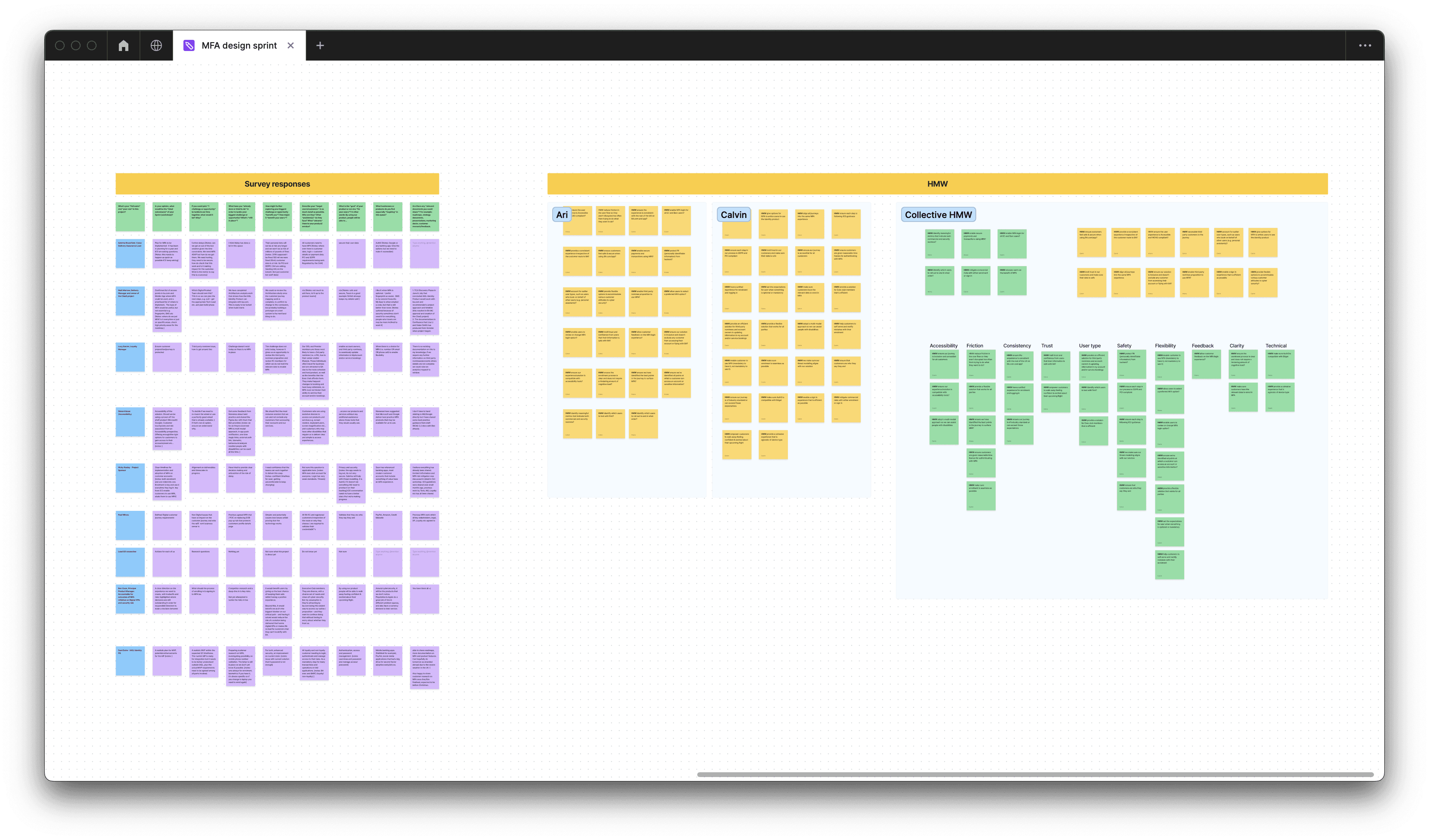


The synthesis from the stakeholder interviews.
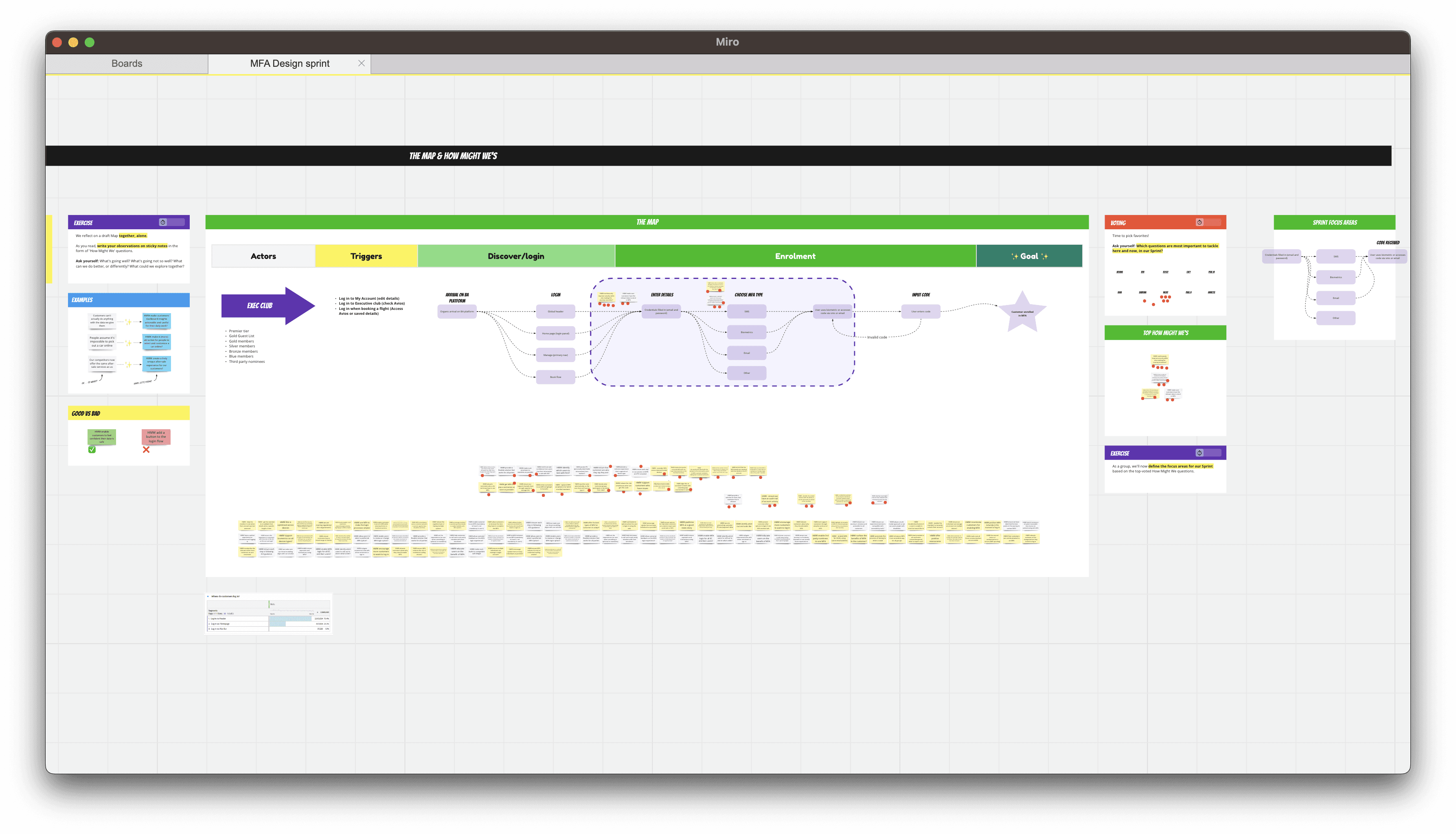


A closeup of the map exercise from day 1 of the sprint.
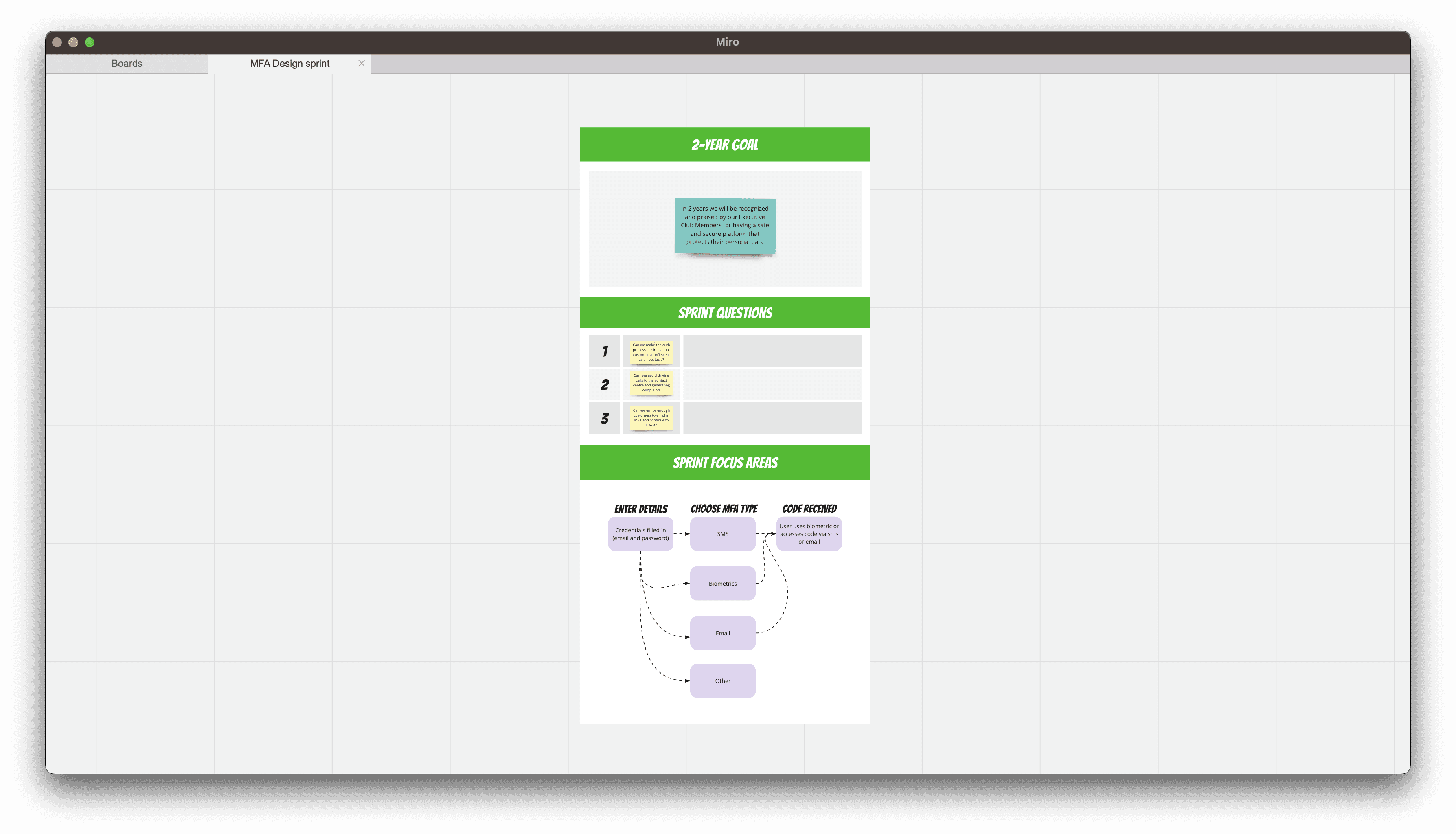


The 2 year goal, sprint questions and the area of focus for the sprint.
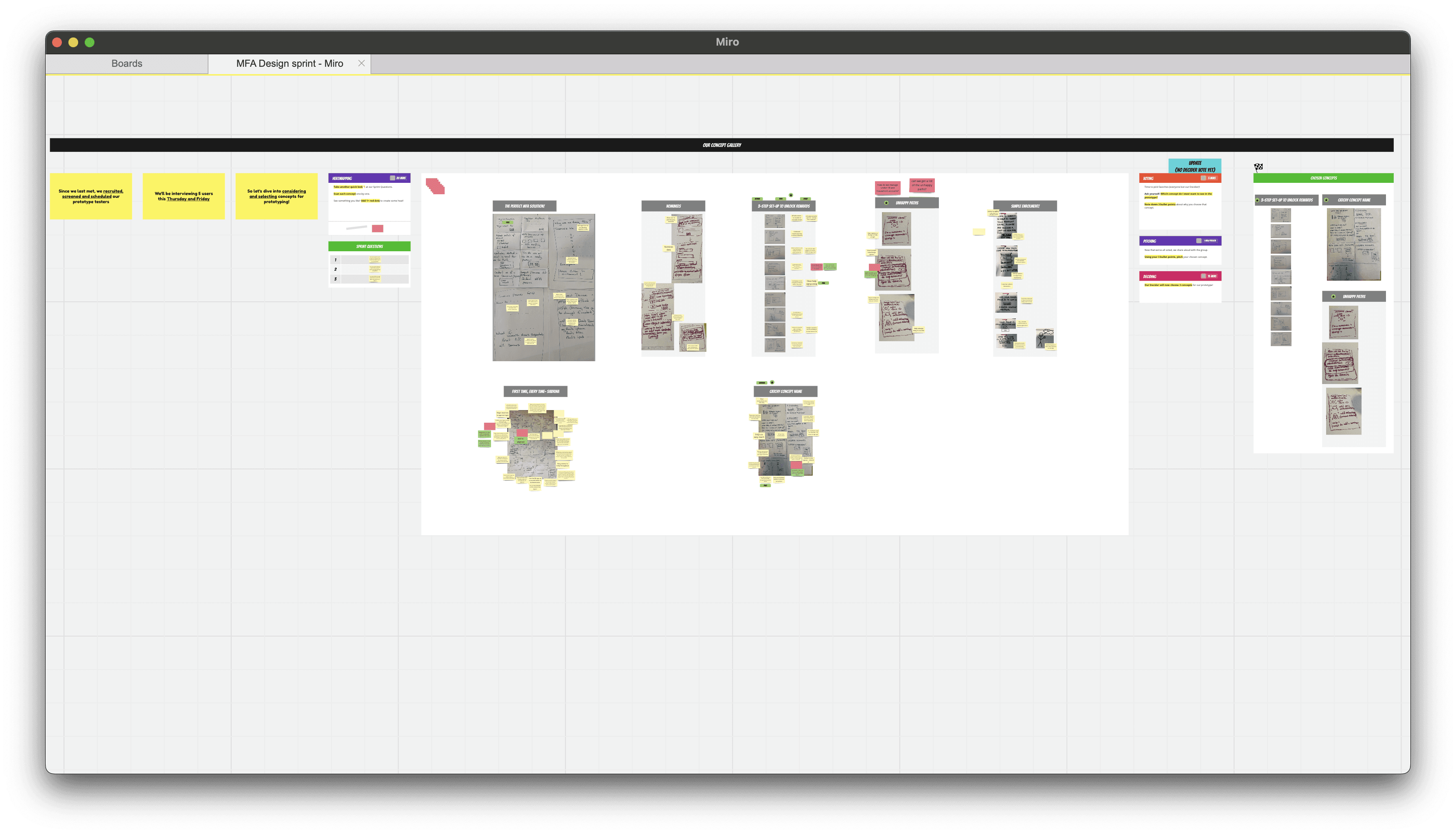


The concept gallery heatmapping.
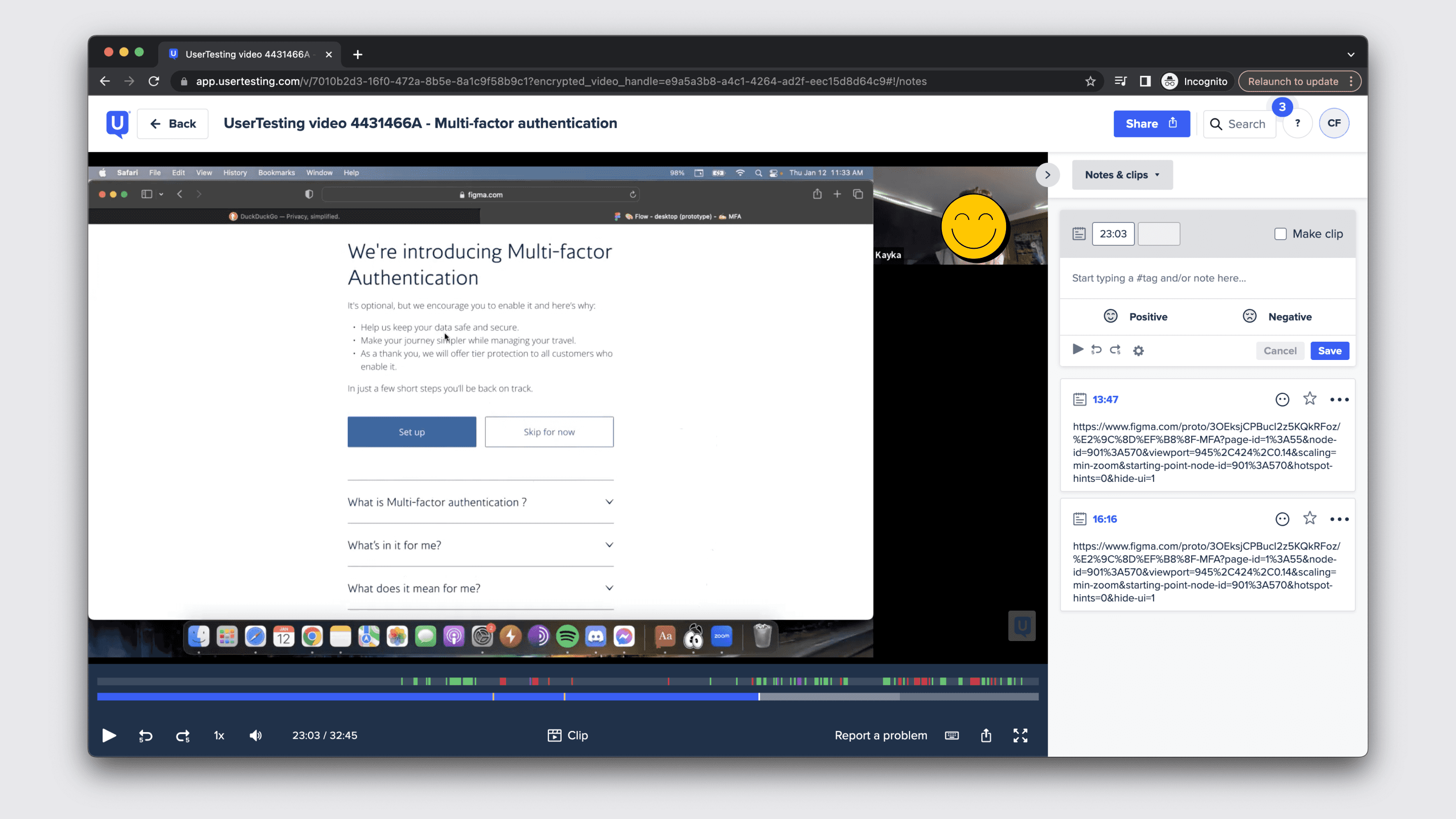


A screenshot from the moderated user testing conducted.



A hero image of the final outcome.
Outcome
I evaluated our customers expectations, while pulling out key requirements for the experience which would need more thinking from a business perspective and pushed alignment across the business in record time.
The impact
I pushed forward with a human centred plan to deliver a world class experience. The project had been running for 378 days with no decisions before I joined the project. Which equates to 102 meetings meaning 102 hours were spent talking without action.
How the sprint helped 👇
• Customer expectations and usability evaluated
• 5 business functions aligned on the plan
• Time to decision = 4 days
• Time to market = 6 sprints
Outcome
I evaluated our customers expectations, while pulling out key requirements for the experience which would need more thinking from a business perspective and pushed alignment across the business in record time.
The impact
I pushed forward with a human centred plan to deliver a world class experience. The project had been running for 378 days with no decisions before I joined the project. Which equates to 102 meetings meaning 102 hours were spent talking without action.
How the sprint helped 👇
• Customer expectations and usability evaluated
• 5 business functions aligned on the plan
• Time to decision = 4 days
• Time to market = 6 sprints
Outcome
I evaluated our customers expectations, while pulling out key requirements for the experience which would need more thinking from a business perspective and pushed alignment across the business in record time.
The impact
I pushed forward with a human centred plan to deliver a world class experience. The project had been running for 378 days with no decisions before I joined the project. Which equates to 102 meetings meaning 102 hours were spent talking without action.
How the sprint helped 👇
• Customer expectations and usability evaluated
• 5 business functions aligned on the plan
• Time to decision = 4 days
• Time to market = 6 sprints